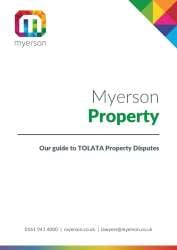Our Property Ownership Dispute Service
One of the most common property disputes can be seen between unmarried cohabitees.
Contrary to popular belief, in England and Wales, there is no such thing as a "common law spouse".
When it comes to separation or the death of a partner, cohabiting partners do not have the same legal protections as married couples or those in civil partnerships.
In fact, unless the property is jointly owned, cohabiting individuals do not have guaranteed rights to each other's property in the event of separation or death.
Cohabiting couples are surprised that they may not be entitled to half of the property, as they might have assumed.
If you find yourself in a cohabitation dispute, it is important to speak with a professional property dispute lawyer, such as a member of Myerson Solicitors' Property Litigation team.
Our TOLATA lawyers understand all aspects of cohabiting couples' separation rights.
How Do Cohabitation Disputes Arise?
Primarily, disputes over jointly owned property arise when a relationship breaks down, and the joint owners disagree on whether the property should be sold or the proportion of the equity each of them should receive when the property is sold.
However, cohabitation property disputes can arise from several factors, such as disagreements over the following:
- property ownership
- financial contributions
- child custody
- lack of legal protections for unmarried partners
- inheritance issues
- shared debts
- separation agreements
- domestic conflicts
Addressing these concerns through legal agreements, such as a cohabitation agreement, and clear communication is essential to prevent and resolve property disputes.
Cohabiting Couples Property Ownership Disputes Resolution
If you co-own a property and cannot agree on its sale or the division of equity, you have the option to seek resolution through the Court.
Court proceedings involve applying under the Trusts of Land and Appointment of Trustees Act 1996 (TOLATA).
TOLATA grants the Court extensive authority to order the sale of the property and determine the equity distribution.
Myerson is ready to assist you throughout this process, whether you are defending your rights or pursuing them in a property dispute.
Our independent legal advice can help resolve your cohabitation dispute.
If you find yourself in a joint ownership dispute, it's advisable to consider severing the joint tenancy and assessing your need for a new Will.
Watch Our TOLATA Video
Crucial Legal Documents for Property Ownership Security
To ensure there is no ambiguity around property ownership, should the relationship end, it is important to obtain the following legal documents:
Cohabitation Agreement
A cohabitation agreement is a legally binding contract for couples living together or planning to move in together.
Cohabitation agreements outline financial provisions, from property sale division to ownership of valuable assets and handling shared property in case of separation.
The agreement reduces uncertainty in shared living arrangements, and Myerson's Property Litigation solicitors specialise in drafting bespoke solutions for your unique needs.
Declaration of Trust Deed
A Declaration of Trust deals with property ownership and can be established before or after property acquisition.
Changes to ownership shares require a mutual agreement between joint tenants.
A Declaration of Trust document can be part of the property purchase agreement or can be drafted as a separate document.
For example, it can outline that person A receives a specific percentage of the sale proceeds while person B gets the rest.
Alternatively, it may allocate a fixed equity amount to one person, with the remaining shares determined by mutual agreement.
Our property ownership dispute lawyers can help set up a declaration of trust to ensure you are protected.
Wills
It is crucial to have a Will. For cohabiting families, Wills are imperative as intestacy rules don't recognise cohabitants or consider non-biological or non-adopted children.
If a cohabiting partner dies without a Will, the surviving partner typically won't inherit their estate, except for jointly owned property and named beneficiary policies.
Lack of a valid Will can lead to assets going to the deceased's biological family, potentially leaving the surviving partner with no entitlement, or requiring costly legal action.
Myerson Solicitors have expert Wills, Trusts, Probate and Contentious Probate lawyers who can help set up a Will or proceed with Will disputes.
Why Work With Our Property Ownership Dispute Team
- We have been ranked as a Top Tier law firm by the Legal 500 for the last seven years.
- You will have access to the full Property Litigation and Family law experts across Myerson.
- You will receive city-quality property and family legal advice at regional prices.
- We provide a partner-led service to ensure you receive the best legal advice and commercially-minded support.
- We have a large team which is capable of meeting your deadlines.
- We are a full-service law firm operating from a one-site office, which means our teams communicate effectively and efficiently.
- We use the latest technology to ensure that we are working as efficiently as possible and that geographical distance is no bar to us from providing excellent client service.
- We were the winners of ‘Property Team of the Year 2021’ at the Manchester Legal Awards.
- Look at the Myerson Promise for further benefits of working with us here.
Cohabiting Couples Property Ownership FAQs
What is a cohabitation agreement?
A cohabitation agreement is a documented record of agreements between partners that covers several aspects of their shared life.
The cohabitation agreement will establish the conditions for cohabitation and outlines outcomes should the relationship end.
It covers property, division of sale proceeds, and potential financial support post-separation.
The primary objectives of a cohabitation agreement include:
- Defining daily living arrangements, such as bills and home ownership.
- Ensuring an amicable separation by providing details of individual responsibilities and entitlements should the relationship end.
- Specifying individual ownership of property at the beginning of the agreement.
The agreement encourages a fair financial organisation to prevent financial losses for either party if the relationship terminates.
What is the main difference between cohabitation and marriage?
The key difference between cohabitation and marriage is that marriage is a legally recognised union with specified legal rights and obligations.
On the other hand, cohabitation is a domestic partnership which does not receive the same legal status or protections.
When should a cohabitation agreement be made?
To ensure the security of your property and finances, cohabitation agreements should be made prior to moving in together or as soon as possible after making the decision to become joint tenants.
It is best to establish the agreement while the relationship is harmonious to avoid potential property disputes later on.
What should or should not be included in a cohabitation agreement?
A cohabitation agreement should include provisions relating to financial aspects, such as property division, expense sharing, and ownership of assets.
It can address support and maintenance, child custody and support, and a process for resolving disputes, such as alternative dispute resolution.
The agreement should not include illegal or unreasonable terms, personal lifestyle choices, or child custody terms that violate legal standards.
Consulting a legal professional is essential to create a valid and fair cohabitation agreement.
Contact Myerson Solicitors' Property Litigation lawyers today.
What steps can cohabitants take to protect their interests?
Cohabitants can protect their interests by taking the following steps:
- Cohabitation Agreement: Draft a legally binding agreement specifying property division, financial responsibilities, and support arrangements.
- Declaration of Trust: Create a document addressing property ownership and how proceeds will be split should the partners separate.
- Financial Clarity: Be transparent about financial contributions, shared assets, and expenses.
- Wills: Establish individual Wills to ensure assets are distributed as intended.
- Legal Advice: Seek legal counsel when creating agreements or addressing property ownership disputes.
What does tenants in common mean?
Tenants in common is a legal term used to describe a form of property ownership where two or more individuals jointly own a property but have distinct, separate shares or interests in it.
The joint owners hold a specific percentage of the property, and these shares may not be equal.
When one co-owner passes away, their share can be passed on to their heirs through a will or according to intestacy laws.
The share division contrasts with joint tenancy, where co-owners have an equal and undivided interest in the entire property, and when one owner dies, their share automatically passes to the surviving joint owner.
Tenants in common allows for more flexibility and control over individual shares in the property.
My partner and I own a property 50/50. Can our share in the property change so that I am entitled to more than 50%?
If there is an express provision in the transfer document or in a Declaration of Trust, the parties will be bound by those terms unless they can establish:
- That the declaration was invalid or incorrect.
- There has been fraud, mistake, or undue influence.
- That there has been a subsequent variation.
This won't be easy, but in some cases, it may be possible.
If you think your circumstances may fit, please call Myerson Solicitors to discuss further.
My ex-partner and I jointly own a property. He moved out, and I have continued paying the mortgage. Am I entitled to a greater share?
Paying the mortgage or other household expenditure does not entitle you to a greater share of the equity.
You may, however, be entitled to compensation for the money you have spent by way of "equitable accounting". This allows the Court to make adjustments to the money received by each party, even where shares are fixed.
Included in equitable accounting can be payments towards the mortgage or, in some cases, improvements to the property or an obligation on one party in occupation to pay occupation rent to the other party post-separation.
If you have excluded your ex-partner from the property, then he may be entitled to ask you to pay rent for occupying the property and may insist on conditions for your continued occupation of the property.
I have separated from my ex-partner, who I have lived with for years, in a property in his sole name. Am I entitled to anything?
It is possible for a person who is not the legal owner of a property but has made certain types of contribution towards it to acquire a financial interest in it.
However, this is a potentially complicated situation that would turn on each case's facts.
If my ex-partner and I have children together, does that mean I am entitled to more of the property?
If you have children together, you may have extensive financial claims pursuant to Schedule 1 of the Children Act 1989.
These claims can cover various aspects, such as a housing claim, a lump sum claim, a claim for additional maintenance beyond Child Maintenance Service payments where applicable, and a request to cover your legal fees.
Housing claims are normally restricted to providing accommodation for you and your children whilst the children are under the age of 18 years or remain in full-time tertiary education.
If you are in this situation, then our experts will be able to assist you in relation to your TOLATA claim and Schedule 1 claim.
Meet Our Property Ownership Dispute Solicitors
Home-grown or recruited from national, regional or City firms. Our property ownership dispute lawyers are experts in their fields and respected by their peers.
Contact Us
Book your consultation using the below enquiry form. Alternatively, you can call us on









